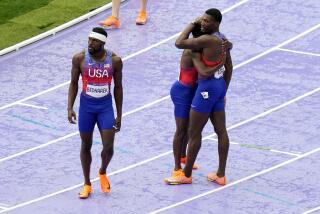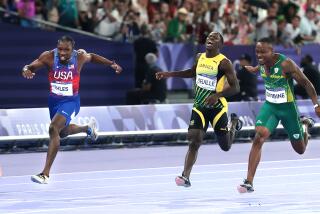Good Will Gives Way to a Big Dispute as Scott Fails to Beat the Heats in 1,500
- Share via
MOSCOW — The coach of the U.S. men’s track and field team calls it the “international bush league.”
A U.S. javelin thrower calls it “synchronized confusion.”
A U.S. middle-distance runner calls it an “asinine” way to run a track meet.
“But what do you expect from the Soviet Union?” Steve Scott added, moments after he called his third-place finish in the 1,500 meters Tuesday “bogus” and labeled the U.S. men’s coaching staff “inept.”
In case you haven’t guessed it, this is about the Goodwill Games.
Until Tuesday, it was just that, games of good will, the games at which WTBS superstation owner Ted Turner had interrupted a press conference one afternoon to tell reporters about his, as he put it, “Commie buddies.” And Soviet leader Mikhail S. Gorbachev, in his speech at the opening ceremony, had gone out of his way to praise American business for its role in the games.
A Soviet group called “athletes for peace” held a press conference Tuesday afternoon. Invited to speak were several Americans, including track and field’s Carol Lewis, Carl Lewis’ sister, and Willie Banks. They couldn’t say enough about the mutual understanding that people with different ideologies can reach simply by meeting one another, even if it’s through athletic competition.
A few hours later, the only understanding that Harry Groves, the U.S. men’s track and field coach, had was that he didn’t understand what was happening. He had his suspicions, though.
“Somebody’s trying to get an advantage somewhere,” said Groves, the men’s coach at Penn State.
That is not the first time that charge has been made in an international track and field competition. The rest of the world, or at least the part of it that was here, made the same charge against the Soviets during the 1980 Summer Olympics. Adrian Paaulen, president of the International Amateur Athletic Federation, had to personally intervene on behalf of the other countries. The IAAF is the world governing body for track and field.
But even if the IAAF found that there were irregularities here, there is nothing it could do about it.
“They have absolute control of the meeting,” IAAF spokesman Jon Wigley said of the Soviets.
It became obvious on Sunday, the first full day of competition, that this was not going to be just another track and field meet. The Soviet Union’s best high hurdler, Andrei Prokofyev, was placed in the first heat, which is supposed to be the slow heat, while the other top hurdlers, including American Greg Foster, were placed in the second heat, the fast heat.
After Prokofyev ran a Soviet-record 13.28 seconds, which tied the European record, Foster had to beat that in order to win the gold medal.
Groves fumed.
IAAF rules allow for heats to be run, with the best times determining the order of finish, in only the 200-, 400- and 800-meter races and in the 400-intermediate hurdles. But even in those events, such a process rarely takes place outside the Soviet Union.
Inside the Soviet Union, however, it is always done, not only in those events but also in all the running events. It is a matter of political philosophy. The Soviets do not like to designate fast heats and slow heats because that establishes a class structure.
When Groves met with the Soviets before the competition began, they told him that it would be an insult to athletes from developing countries, Zimbabwe for example, if they were placed in heats that were regarded as inferior.
“It was in the spirit of the Goodwill Games,” Groves said.
As much in favor of good will as the next guy, Groves agreed. But he specified that the top two Soviets should be in the fast heat of each event, along with the top two Americans. For the sake of strategy, athletes want to be in the same race against their strongest competition. He said the Soviets agreed.
Then he watched Prokofyev turn in a 13.28 in the slow heat.
“And they gave him a rolling start,” Groves said.
It didn’t become an issue at that time because Foster completed the event in 13.25, the fastest time in the world this year.
Groves said he complained at the technical meeting Monday morning.
“Suddenly, there was a language barrier,” U.S. sprint coach Mel Rosen of Auburn said.
The men’s 200 and 400 were run in heats Monday, when Groves again suspected that the Soviets were attempting to put fast ones over on the Americans.
He said he intended to complain again at the scheduled technical meeting Tuesday morning, but only the American coaches showed up for it.
Then, on Tuesday afternoon, the Soviet Union’s second-fastest 1,500-meter runner, Pavel Yakovlev, was placed in the first heat, while the two Americans, Steve Scott and Jim Spivey, were placed in the second heat, along with the No. 1 Soviet, Igor Lotorev.
It is particularly unfair to determine the order of finish in the 1,500 based on times in two heats, because the race is such a strategic one. If the pace is faster in one heat, the winner is going to come from that heat, no matter how good the athletes are in the other heat.
But it is even more unfair to the athletes in the second heat if they do not know they are running against the time of the winner of the first heat. Scott and Spivey said that is what happened to them Tuesday.
Uninhibited by the other runners and setting his own pace, Yakovlev won the first heat in 3:39.96.
Caught in a slow, tactical race in the second heat, Scott ran 3:40.31 and finished behind Lotorev’s 3:40.18. Spivey finished right behind Scott in 3:40.41.
Scott and Spivey then went to accept their medal. Only then did Scott discover that he had finished third and Spivey out of the money.
Scott was livid, blaming the American coaches for not informing him before the race that he would have to run against the clock.
“There is only one group to blame--the American coaches,” Scott said. “It’s the most inept group of coaches I’ve seen in my life. They knew (the system) yesterday, and Jim and I didn’t know it until after the race today.”
As far as the IAAF is concerned, Scott will get second-place points in the Grand Prix scoring system and Spivey will get third, but that didn’t leave Scott feeling good will toward the Goodwill Games.
“How can that guy (Yakovlev) be in first place when he didn’t run against us?” Scott said. “It’s the most bogus thing I’ve ever seen.
“But if that’s the way they have to do it, fine. Just let the runners know.”
Asked if he had complained to Harry, Scott said: “Harry who?”
Told that the U.S. coach is Harry Groves, Scott said: “I haven’t even seen Harry.”
Groves admitted he made a mistake in not contacting Scott and Spivey, who ran in Oslo on Saturday night and did not arrive in Moscow until the next night.
“I assumed he knew,” Groves said.
Groves had complaints of his own.
“This is not in the best interests of the Goodwill Games,” he said of his suspicions about the Soviets. “They don’t want to go head-to-head with us. We wouldn’t do the same thing to them. Everybody should be able to compete against the best. I call it international bush league.”
American javelin thrower Bob Roggy had a more original description of it after going nose-to-nose with a Soviet official during a dispute in the competition Sunday. He called it “synchronized confusion.” Perhaps it will be a new event at the next Goodwill Games.
More to Read
Go beyond the scoreboard
Get the latest on L.A.'s teams in the daily Sports Report newsletter.
You may occasionally receive promotional content from the Los Angeles Times.






